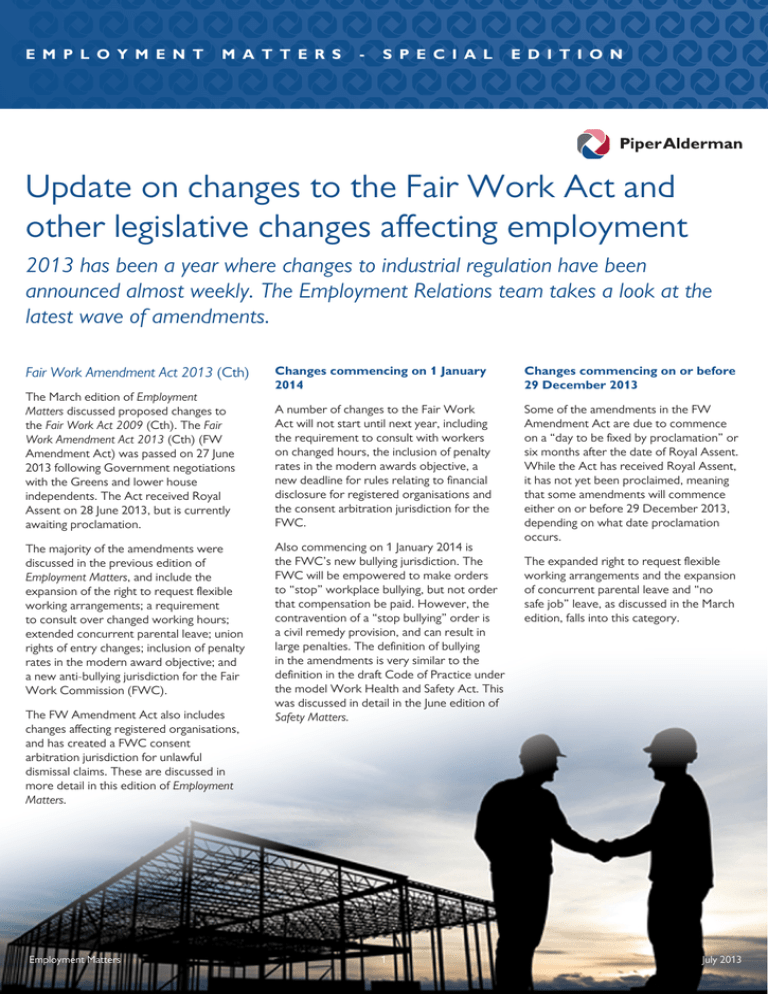Update on changes to the Fair Work Act and other
advertisement

e m p l o y m e n t m a t t e r s - s p e c i a l e d i t i o n Update on changes to the Fair Work Act and other legislative changes affecting employment 2013 has been a year where changes to industrial regulation have been announced almost weekly. The Employment Relations team takes a look at the latest wave of amendments. Fair Work Amendment Act 2013 (Cth) The March edition of Employment Matters discussed proposed changes to the Fair Work Act 2009 (Cth). The Fair Work Amendment Act 2013 (Cth) (FW Amendment Act) was passed on 27 June 2013 following Government negotiations with the Greens and lower house independents. The Act received Royal Assent on 28 June 2013, but is currently awaiting proclamation. The majority of the amendments were discussed in the previous edition of Employment Matters, and include the expansion of the right to request flexible working arrangements; a requirement to consult over changed working hours; extended concurrent parental leave; union rights of entry changes; inclusion of penalty rates in the modern award objective; and a new anti-bullying jurisdiction for the Fair Work Commission (FWC). The FW Amendment Act also includes changes affecting registered organisations, and has created a FWC consent arbitration jurisdiction for unlawful dismissal claims. These are discussed in more detail in this edition of Employment Matters. Employment Matters Changes commencing on 1 January 2014 Changes commencing on or before 29 December 2013 A number of changes to the Fair Work Act will not start until next year, including the requirement to consult with workers on changed hours, the inclusion of penalty rates in the modern awards objective, a new deadline for rules relating to financial disclosure for registered organisations and the consent arbitration jurisdiction for the FWC. Some of the amendments in the FW Amendment Act are due to commence on a “day to be fixed by proclamation” or six months after the date of Royal Assent. While the Act has received Royal Assent, it has not yet been proclaimed, meaning that some amendments will commence either on or before 29 December 2013, depending on what date proclamation occurs. Also commencing on 1 January 2014 is the FWC’s new bullying jurisdiction. The FWC will be empowered to make orders to “stop” workplace bullying, but not order that compensation be paid. However, the contravention of a “stop bullying” order is a civil remedy provision, and can result in large penalties. The definition of bullying in the amendments is very similar to the definition in the draft Code of Practice under the model Work Health and Safety Act. This was discussed in detail in the June edition of Safety Matters. 1 The expanded right to request flexible working arrangements and the expansion of concurrent parental leave and “no safe job” leave, as discussed in the March edition, falls into this category. July 2013 Consent arbitration of general protections dismissal claims From 1 January 2014, the FWC will be able to arbitrate general protections disputes involving dismissals, where the parties consent. This amendment was put in the amending bill at a late stage, and it is not clear what prompted the government to include it, though it seems to have been generally welcomed. While the FWC will be able to arbitrate general protection dismissal claims, they are still required to first deal with the matter in a non-arbitration manner, such as conciliation or mediation. The FWC must also continue to issue a certificate that all reasonable attempts to resolve the dispute other than arbitration have been, or are likely to be, unsuccessful. Once a certificate is issued, the dismissed employee will have 14 days to either: • make a general protections or unlawful termination court application • elect not to proceed further with the dispute • with the consent of their former employer, agree that the FWC conduct consent arbitration to resolve the dispute. The employer essentially has a right of “veto” over whether a dispute will be put before the FWC or the court systems. Employment Matters In conducting consent arbitration, the FWC has its usual powers, and can make orders to reinstate the dismissed employee, compel the employer to compensate the employee (with no cap on that amount) or make orders about the continuity of employment and/or service. The FWC however cannot order an employer to pay penalties, unlike in a court application. Once an employee has elected to have the FWC arbitrate the dispute, no general protections court application can be made concurrently. Further, a party can only appeal in circumstances similar to those in an unfair dismissal claim, where the FWC determines it is in the public interest. Financial disclosure requirements for registered organisations The FW Amendment Act has also extended the deadline for registered unions or employer associations to update their rules to be compliant with respect to financial disclosures to 1 January 2014. Previously, organisations were meant to have updated their rules by 1 July 2013. While the requirement to have rules compliant with the Act does not apply until next year, the FW Amendment Act requires registered organisations to make certain disclosures for the period 1 July 2013 to 31 December 2013, even in the absence of any rules. 2 The amendments also make it clear that the payment of remuneration to officers of an organisation, or reimbursements for that officer’s reasonable expenses, are not required to be disclosed as a “payment to a related party”. Migration Amendment (Temporary Sponsored Visas) Act 2013 (Cth) The Act was passed by both houses of the federal parliament on 28 June 2013, and was given Royal Assent on 29 June 2013. The Act has added a requirement for approval to nominate a sponsored worker that the employer-sponsor has undertaken “labour market testing” in the previous four months. Previously, labour market testing was not compulsory. As a part of labour market testing, the employer needs to provide evidence of the testing and notify the Department of Immigration and Citizenship of any redundancies or retrenchments which have occurred in the past four months. The sponsor also needs to provide evidence that there are no suitably qualified and experienced citizens, permanent residents or other temporary visa holders readily available to take up the position. There are some skills and occupational exemptions as specified by legislative instrument, and a “major disaster” exception. July 2013 The requirements for labour market testing will commence either on or before 30 December 2013, depending on when the Act is proclaimed. Other changes will commence immediately. Previously, when a 457 visa-holder lost their job, they had 28 days to find a new job before being in breach of their visa conditions. This has been extended to 90 days, and applies to all current and future 457 visa-holders. The Act also appoints Fair Work inspectors as inspectors for the purposes of the Migration Act, giving them the power to monitor and investigate compliance with sponsorship obligations. The inspectors have the power to ensure that overseas workers are being paid market salary rates and are working in their nominated occupation. When these measures were first announced at the beginning of June, the Department of Immigration and Citizenship had only approximately 32 inspectors nationally. Now that the power to inspect has been extended to Fair Work inspectors, there will be over 300 inspectors exercising inspection and compliance powers under the Migration Act. This indicates a “crack-down” on exploitative employer-sponsors and visaholders that are in breach of their visa conditions. Employment Matters Sex Discrimination Amendment (Sexual Orientation, Gender Identity and Intersex Status) Act 2013 (Cth) On 28 June 2013, both houses of parliament passed this Act, which amends the Sex Discrimination Act, to replace “marital status” with “sexual orientation, gender identity, intersex status, marital or relationship status” as a protected attribute. There are some exemptions for voluntary bodies, competitive sporting activities and religious organisations, but these do not extend to the provision of Commonwealth-funded aged care or aged care accommodation. The amendments will commence either on or before 29 December 2013, as the Act has received Royal Assent, but is awaiting proclamation. Public Interest Disclosure Bill 2013 (Cth) This Bill was passed by both houses of federal parliament on 26 June 2013. The Bill is not yet law, however, as it has not received Royal Assent. It is unknown when the provisions will commence. The Bill extends adverse action protection to federal public servants who “blow the whistle” on wrongdoing within their department or agency. Essentially, the Bill makes whistleblowing a “workplace right” which is protected by the Fair Work Act 2009 (Cth). 3 The Bill gives whistle-blowers protection from “reprisals”, being an act or omission which causes detriment to a current or future whistle-blower. Detriment is defined as including dismissal, injury, alteration to an employee’s position to their detriment, or discrimination between government employees. Reprisals carry penalties of up to $20,400. Under the Bill, the Federal Court or Federal Circuit Court can order compensation, injunctions, and apologies for employees who suffer, or are likely to suffer, a reprisal from their employer, as well as reinstatement if they are dismissed, or a combination. The Bill prevents “double dipping”, however, stating that an employee cannot make a general protections application at the same time as applying for a “reprisal” remedy. With so many changes just around the corner affecting employers and employees alike, employers should ensure they are up to speed. In particular, policies and practices relating to workplace bullying, consultation, flexible working arrangements, and 457-visa workers should be reviewed. If you have any concerns about how these legislative changes will impact your business, please contact a member of the Employment Relations team for advice. July 2013 [ p u b l i c a t i o n n a m e ] Employment Relations Team David Ey Partner t +61 8 8205 3310 dey@piperalderman.com.au Tim Capelin Partner t +61 2 9253 9936 tcapelin@piperalderman.com.au Contact us Sydney Erin McCarthy Partner t +61 8 8205 3468 emccarthy@piperalderman.com.au Professor Andrew Stewart Consultant t +61 8 8205 3338 astewart@piperalderman.com.au Penny Brooke Senior Associate t +61 8 8205 3441 pbrooke@piperalderman.com.au Elise Jenkin Associate t +61 8 8205 3482 ejenkin@piperalderman.com.au Sharlene Wellard Partner t +61 2 9253 3827 swellard@piperalderman.com.au Level 23 Governor Macquarie Tower 1 Farrer Place Sydney NSW 2000 DX 10216, Sydney Stock Exchange t + 61 2 9253 9999 f + 61 2 9253 9900 Melbourne Stephen Dowd Special Counsel t +61 8 8205 3432 sdowd@piperalderman.com.au Ben Motro Senior Associate t +61 2 9253 9910 bmotro@piperalderman.com.au Katie Kossian Lawyer t +61 2 9253 3848 kkossian@piperalderman.com.au Emily Haar Lawyer t +61 8 8205 3390 ehaar@piperalderman.com.au Level 24 385 Bourke Street Melbourne VIC 3000 GPO Box 2105 Melbourne VIC 3001 DX 30829, Collins Street t + 61 3 8665 5555 f + 61 3 8665 5500 Brisbane Riverside Centre Level 36 123 Eagle Street Brisbane QLD 4000 GPO Box 3134 Brisbane QLD 4001 DX 105, Brisbane t + 61 7 3220 7777 f + 61 7 3220 7700 Adelaide Level 16 70 Franklin Street Adelaide SA 5000 GPO Box 65 Adelaide SA 5001 DX 102, Adelaide t + 61 8 8205 3333 f + 61 8 8205 3300 www.piperalderman.com.au Follow us on Employment Matters 4 July 2013
